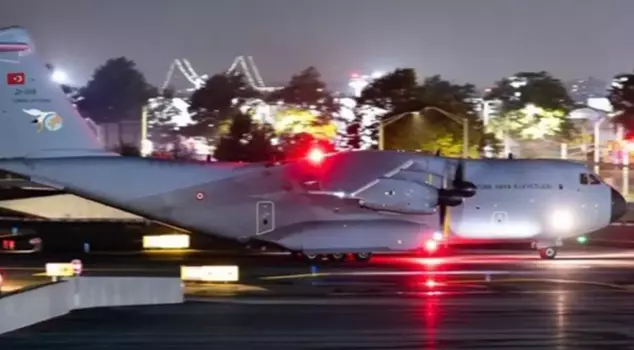
28.04.2025 08:10
Tensions between Pakistan and India are escalating. In response to a terrorist attack in India's Jammu and Kashmir region on Tuesday that resulted in the deaths of 26 civilians, India retaliated by cutting off the water flow in the Indus Basin, preventing water from reaching Pakistan. Following these developments, Turkey sent six cargo planes carrying military supplies, including drones, to Pakistan.
Here is the translated HTML content with the text and the `title` and `alt` attributes of the `img` tag translated into English:
In an armed attack in the region of Jammu and Kashmir controlled by India, 26 people lost their lives. Following this, India cut off the flow in the Indus Basin, preventing water from reaching Pakistan. The tension that began between the two nuclear powers continues to escalate rapidly. Indian Prime Minister Narendra Modi stated, "Jammu and Kashmir has grown in many areas from tourism to the education sector in recent years. Those who are disturbed by this want to destroy Kashmir again. However, justice will prevail."
"TURKEY IS SENDING US SUPPORT"
Pakistan's Chief of Army Staff Syed Asim Munir increased the stakes by saying, "If the water flow is not restored, we will strike the dam." Pakistan's Foreign Minister Muhammad Ishaq Dar also held a phone conversation with his Chinese counterpart Wang Yi, seeking cooperation. It was reported that the Pakistani army was transporting howitzers to the border, while there were claims of attacks on Indian outposts from time to time. Additionally, it was reported that six transport planes belonging to the Turkish army were delivering war materials to Pakistan. These materials included weapons and missiles, as well as drones. Pakistani officials stated, "Turkey is showing silent but real support. Keep watching us."
CONFLICTS CONTINUE
The tension is high following a terrorist attack in Jammu and Kashmir, India, which resulted in the deaths of 26 civilians on Tuesday. Indian and Pakistani soldiers engaged in armed conflict for the second consecutive day. In a statement from the Indian army, it was noted that Indian soldiers responded to fire from numerous Pakistani army outposts along the 740-kilometer Line of Control separating Indian and Pakistani regions of Kashmir around midnight. It was reported that Pakistani forces also opened fire intermittently around midnight on Thursday, with no casualties on the Indian side. No statement has yet been made by the Pakistani army.
PAHALGAM TERROR ATTACK
In the Pahalgam region of Jammu and Kashmir, administered by India, armed individuals opened fire on tourists on April 22, resulting in the deaths of 26 people and many injuries.
India, accusing the attackers of having "come from Pakistan," suspended the "Indus Waters Treaty," requested that Pakistani diplomats in New Delhi leave the country within a week, and announced the suspension of visa services for Pakistani citizens, stating that all previously issued visas were canceled.
On the other hand, Pakistan rejected the accusations and imposed restrictions on the number of Indian diplomatic personnel in Islamabad, declared that any intervention in the rivers outside the "Indus Waters Treaty" would be considered a "cause for war," suspended all trade with India, and closed its airspace.
KASHMIR, A DISPUTED REGION
Kashmir has been divided since Pakistan and India gained independence in 1947. Both countries claim rights over the entire region of Kashmir. India refers to the part it controls as "Jammu and Kashmir," while Pakistan calls its controlled territory "Azad Kashmir."
The tensions between predominantly Hindu India and predominantly Muslim Pakistan over Kashmir escalated after the Indian government unilaterally revoked its semi-autonomous status in 2019, directly linking Kashmir to New Delhi.
TWO NUCLEAR POWERS
The recent developments in Kashmir have once again highlighted how deep the tensions between India and Pakistan have become. The recent attacks and mutual firing incidents indicate that diplomatic relations between the two countries are on the verge of complete breakdown. India's decision to cut off water has further escalated tensions in the region.
The fact that both countries possess nuclear weapons increases the potential for this tension to escalate into a larger military conflict. It is crucial for the international community to guide India and Pakistan towards seeking a solution without further conflict risk. However, uncertainty remains regarding when these conflicts will come to an end in the current environment.
This translation maintains the original HTML structure while translating the text and the specified attributes.